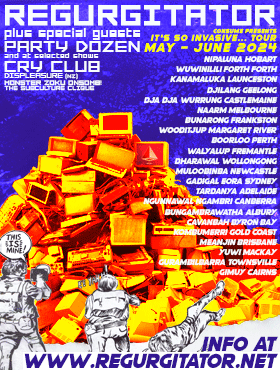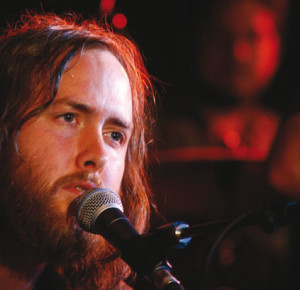 It was the album ‘The Trials of Van Occupanther’ which first set our lips smacking. A tasty combination of 70s west coast breeze and noughties alt-rock cool. It also gave us the alt-radio hit ‘Roscoe’. The less commercially successful, but equally impressive follow up, ‘The Courage of Others’ borrowed more from British folk legends like Fairport Convention and Steeleye Span. They play to sold out crowds at major venues in the UK one minute, and to a solitary rave-dancing girl in smalltown America the next. Back in June, they won Mojo magazine’s Best Live Act award, beating Kasabian, Rufus Wainwright, Arctic Monkeys and Florence And The Machine in their category. Yet despite selling out two Prince of Wales club gigs in Melbourne, the band could still be seen roadie-less, darting on and off stage 10 minutes before show time in full view of the audience, tweaking their own instruments. Welcome to the mercurial world of Texan band Midlake. Australian Musician’s Greg Phillips was invited down to sound check at Melbourne’s ‘Prince’ to meet up with Midlake’s drummer McKenzie Smith and rhythm guitarist Eric Pulido.
It was the album ‘The Trials of Van Occupanther’ which first set our lips smacking. A tasty combination of 70s west coast breeze and noughties alt-rock cool. It also gave us the alt-radio hit ‘Roscoe’. The less commercially successful, but equally impressive follow up, ‘The Courage of Others’ borrowed more from British folk legends like Fairport Convention and Steeleye Span. They play to sold out crowds at major venues in the UK one minute, and to a solitary rave-dancing girl in smalltown America the next. Back in June, they won Mojo magazine’s Best Live Act award, beating Kasabian, Rufus Wainwright, Arctic Monkeys and Florence And The Machine in their category. Yet despite selling out two Prince of Wales club gigs in Melbourne, the band could still be seen roadie-less, darting on and off stage 10 minutes before show time in full view of the audience, tweaking their own instruments. Welcome to the mercurial world of Texan band Midlake. Australian Musician’s Greg Phillips was invited down to sound check at Melbourne’s ‘Prince’ to meet up with Midlake’s drummer McKenzie Smith and rhythm guitarist Eric Pulido.
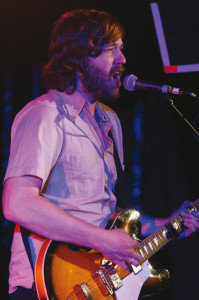 ERIC PULIDO-Rhythm guitar
ERIC PULIDO-Rhythm guitar
GP: You had been listening to British folk bands like Pentangle and Fairport Convention in preparation for ‘The Courage of Others’. Did you also investigate how those bands recorded?
EP: Not as much. A lot of times we would just listen to a tune and try to get that emotion. It wasn’t the technical side of it exactly. I think we were all aware of the nature of how things were recorded back then, not just that style or genre but maybe more specifically that era. Like these guys were given a room and set up some mikes and they’d play the song and that’s it. I realise there was some multi-tracking and such, but I think a lot of it was very live. So we wanted to incorporate that technically as much as possible and still hold on to that feeling and not being of a sterile nature.
There were some pretty extreme recording methods back in the seventies. Did you employ any weird miking techniques?
We ran the gamut of different things, whether it was putting mics in different places, putting towels over them, putting different types, putting multiple ones in front, tape on our fingers … different things to get a certain sound. Because you know there is no equation. If we went back to the studio today, it wouldn’t be a case of we know what to do. It’s always a trial and error effort, where you are trying to reach that sound or feeling for that song. So if it took a different micing technique or you put tape over you fingers, then you
do it.
It’s a very analogue feeling album but I believe it is all digital?
Yeah. We use Radar 24, which is a marriage between analogue and digital You have a control panel with your light readings. You can plug it into a machine and see the waves, but we shy away from that because you start to feel you are just looking at waves for your music. I think Tim was the first to put a record cover in front of the screen so we look at this picture instead of looking at these damn colors or waves. We have an analogue console that we use as well. It’s a little bit of both but it is very digital. The machine that we are using has both pros and cons. The converters sound great and you try to get it as warm as you can. The analogue console’s pre’s sound good alone but we also have outboard gear that we use as well, so its a mixture of things that we use to achieve that.
How did you approach the recording of the acoustic guitar parts on the album?
It was just trying to use our ears and say, what if I put the microphone to the back of the guitar or maybe put one on the twelfth fret and another one back here. If it’s sliding or it’s making this harsh squeaking sound, we’d try tape or powder… just silly stuff like that. Putting the mics together to get a stereo type effect or using an overhead or room mic with a close mic as well. Then go back and listen to it and say, OK this one’s good and that one’s good. We would write down or draw a picture of how it was placed, and you go to the next song and it doesn’t sound the same, so we tried many uneducated ways to make things sound right.
What’s the main gear that you use?
I have a Fender Jazzmaster that I have been using for some time and now I’m using a Epiphone Casino. I have an acoustic Martin D16 which I have had forever but it has been crushed on a plane once and I had it fixed, so now I try not to use it too much. So now I’m using a Gibson J 45 which I love as well. Amplifiers? We all use Vox AC15 or AC 30. We used to use Fenders exclusively and just found it so much nicer to just have that natural distortion on the amp and not rely as much on pedals. Both are great.
Do you use pedals on stage?
It’s changed over the years. It’s pretty basic. Maybe just an overdrive pedal or a reverb, like a Holy Grail or a Wah for some things. As much as we are into recording we are not too big a gear heads. You want to capture the sound of an amp or a guitar as much as possible and not get into this well here’s my pedal board it’s got this big array of things you know but try to just keep to keep it pretty simple.
And the Mojo award, that must have been a huge thing for you?
Yeah, it was just a cool experience. Paul (bassist) and I went and got to meet some of our musical idols and just to be a part of that scene and experience and to win an award like that … that we hardly feel we deserve amongst these other bands that we love. Richard Thompson was there and I got to meet him. I mean Jimmy Page was there which was really cool. Rufus Wainwright, who I really like a lot . Emmy Lou Harris was there … all these people were there who you wouldn’t normally see period, but to see them all in one room, it was kind of neat. I think the most unexpected one I saw was Mark Almond from Soft Cell and I told him how I really enjoyed his music and
I have a soft spot for the eighties. He said ‘Oh I love this last record’. I was like really? I mean
I didn’t expect him to know who we were, much more like the record.
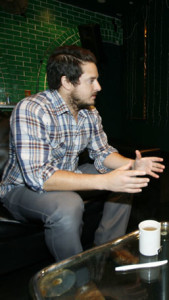 MCKENZIE SMITH-Drums
MCKENZIE SMITH-Drums
GP: Because your studio in Texas is also where you live, you guys tend to put so much time into recordings, agonising over musical details. Do you put that same energy into your live show?
EM: Yeah, we’re trying to. The creative process is that we try to recreate what we did on the album and firstly learn that. It was actually difficult on the last album cycle because there was a lot more went into it … instruments we didn’t have in the band, not enough people playing. We had flute and oboe and some keyboard stuff on there which we couldn’t play live. It was difficult to portray the album. We did OK, but it wasn’t as grand as it could have been. This time we added two more touring musicians to come with us and rearranged some things within the band where Eric Nicholson, who used to play the keyboard parts is now back on guitar, which was his original instrument in the band. We added Max and Jesse. So Max plays a lot of the lead stuff while Eric Pulido is finger picking and singing backing vocals. And Jesse didn’t even know flute before last year. We knew he was an amazing keyboard player and we said, why don’t you go and learn flute. And he did … very quickly! And now (looking over to Jesse) he’s an amazing flautist is Jesse Chandler! And Tim before, didn’t want to play flute by himself but now I think he feels comfortable doing it. He did all the flute on the album and he was actually a great jazz saxophone player. We were all jazz majors years ago at school. So in answer to your question, on this tour, the goal was to not play the album every night but to … you know, stick to the songs but also have sections that are more free and open every night to change and improvisation.
You’re having some trouble with some of the rental gear here at sound check today. How well do you mange to match it up to what you use at home?
We try to get the same amps. They’re all playing Vox and you can pretty much get that anywhere. The drum company I am endorsed by in the states is called C&C from Lawrence, Kansas. They’re excellent drums and they have kits all over the world so usually I am covered. At the Splendour festival, I played a Slingerland but in Sydney they had a C&C. I’m more familiar with those, even though it isn’t my kit, I love the way it sounds.
With the recording of the new album, did you record your drums in the same way you normally do or experiment a bit?
With Trials of Van Occupanther, after we got going I knew more about what I wanted, more of a 70s thing. All of the drums had a T-Shirt over the snare and everything was dry and dead, and not super loud in the mix. Then with this one, we had gone back even further with our influences to the late sixties. A lot of those recordings, they were using a lot less microphones. The first track on the album, ‘Acts of Man’, there are only two drum mics on there. I would experiment with placement, where I could generally get a whole sound of the kit, different mic combinations. I found I really enjoyed using the Royer 121 ribbon mic. It’s a figure 8. I really like the sound of it and I would use it between the toms, above the bass drum facing down to the snare and it picked up the whole drum set great. Then I put another one, a Soundelux U99 in another room. That way I had two options when mixing. I could mess with the panning and see where it fits right. That was definitely different to what we did on the last record, where everything was more close miked. I was definitely going for an even older sound on the new one.
Do you have drum heroes or are you influenced more by other musicians?
Yeah of course, I definitely have drum heroes. Growing up I was into jazz and loved Buddy Rich. As far as rock stuff, Ringo Starr is still one of my idols. Also John Bonham. In recent years, I have really, really been into the drummer from Fairport Convention, Dave Mattacks. Dave Mattacks is like my new hero. I just think his groove is unbelievably amazing. He plays the simplest thing and it sounds amazing all the time. I’m not the biggest drum guy in the world who is always checking out drummers. I’m not that guy. I’m more into bands and music as a whole, but of course I can nerd out, geek out on the drum stuff too!
You won the Mojo award for Best Live Act but I believe you didn’t get to go?
No, I was actually in Colorado about to ask my girlfriend’s father if I could marry his daughter, so I had bigger fish to fry! Eric and Paul went and they had a
good time.
What did the Mojo award mean to you?
Man, it’s amazing to get that. We started to think about where we came from and how many opportunities we’ve had. Even to get this far. This is our second time to have come to Australia. Most bands don’t get to come once. It’s an honour. It’s humbling. It was pretty special, coming from Denton, Texas. Only a few years ago, we were playing in front of nobody in London to all of a sudden winning an award like that is great.
With the directional change from Van Occupanther to The Courage of Others, how much discussion was there about that or was it just a natural progression?
We definitely talked about that. We’d stumbled on to the British folk records.
I knew who Fairport Convention was but never spent a whole bunch of time listening to them. Tim (singer and songwriter) got really involved with that music and became really obsessed with it and it naturally came out in his writing. He didn’t want to sound exactly like them, but he wanted that influence and the direction of the album. So we all just jumped on that together and made sure we studied the records. We listened to all those bands and tried to understand what we needed to borrow from them to be able to have that influence on the album. We spent the first year recording. We didn’t plan to take that long but when you are trying to let something like that come out of you. It’s like if you need to have a certain accent for a movie, you can’t just practice one day and go, OK I got it. You have to sit with it and spend time with it before it becomes natural.
So is that same discussion happening again now, for the next one?
We don’t know. Tim always says he doesn’t know. He’ll never say, it’s probably going to stay about the same, I’ve figured it now now. It has always been like that between our first EP and into 2000 and the first and second and now third album. It has always changed. Every time. I can’t imagine that it would be the same record. In fact, there are a lot of things we are going to try to do differently next time.
Such as?
Just the process of how we record. The schedule that we kept. We used to go in really early in the morning and work all day, so we’ll probably change our hours, and maybe not go in every day. Keep it fresh so that it is not like a job, where you have to be there every single day and you start hating it. We got really burnt out making this record. Just the way we record, and we are also moving studios so that is exciting. A different space for recording so it automatically feel different. The room sounds way different. The main tracking room has hardwood floors and has more ambience. The room previously just had carpet and was like a box.
We spoke about the Mojo award and how great that was. Do you remember a moment you would consider the band’s lowest?
We’ve had some tough times.
Jesse pops in: Aspen!
McKenzie: Aspen? That wasn’t so much low, just funny! That was recent. I’m talking about over the years when we had nothing. We had one tour which was like six weeks long. It was in Europe. We had done some shows with the Flaming Lips and that was the great part of the tour. After that we had a bunch of shows that were half put together by the label. I guess we had an agent at the time but these were small shows that didn’t make us any money … in fact lost money. Being away from home for 6 weeks. Being cold in Europe, all traveling in the van together, staying at crap hotels. There were a couple of times where I felt we were just getting very tense and had a couple of massive arguments. We thought … we just aren’t going to make it. This is the end! Somehow we all stuck it out and we’re so thankful we did. But here we are now.
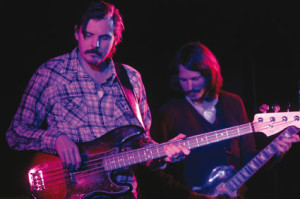 And what happened in Aspen?
And what happened in Aspen?
The US was so where we not needed to be as far as touring when we wanted it to be. The big cities were fine but the in between cities … I mean a lot of people are having tough times at the moment with the recession and also our last record didn’t do so well in the states. So LA, New York, Chicago were fine but playing Aspen, Colorado, ski resort in June … it’s not exactly the best time to play there. Granted, there were about 50 people that came but the room was set up so weird. All the people were in the back so you couldn’t even see them. But there was one girl who came down and danced like she was at a rave. The whole time. She obviously didn’t know who we were and wasn’t a fan. She was just that kind of person who enjoys anything. If there’s music going, she loves it. I wish I could be like that!


